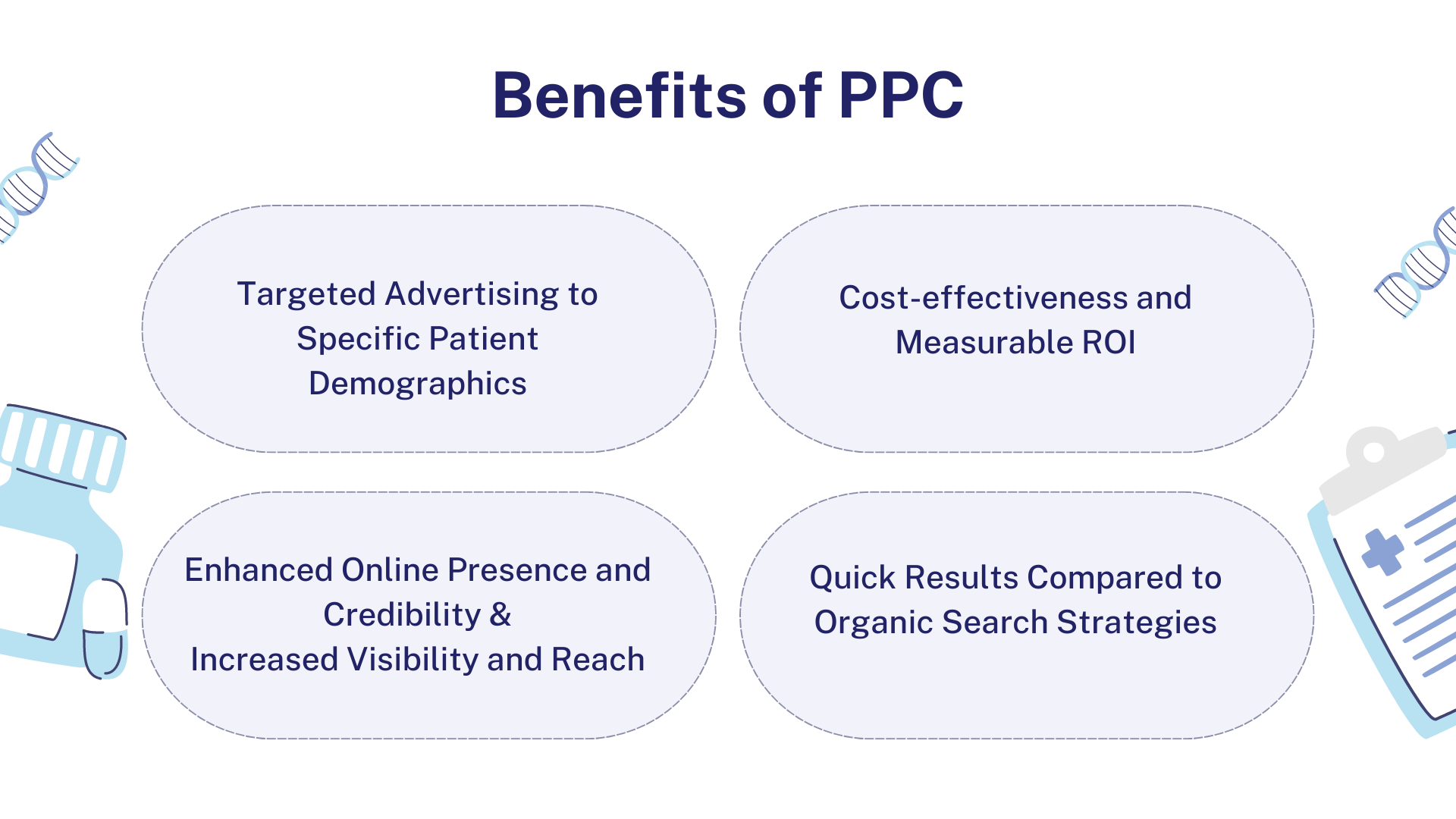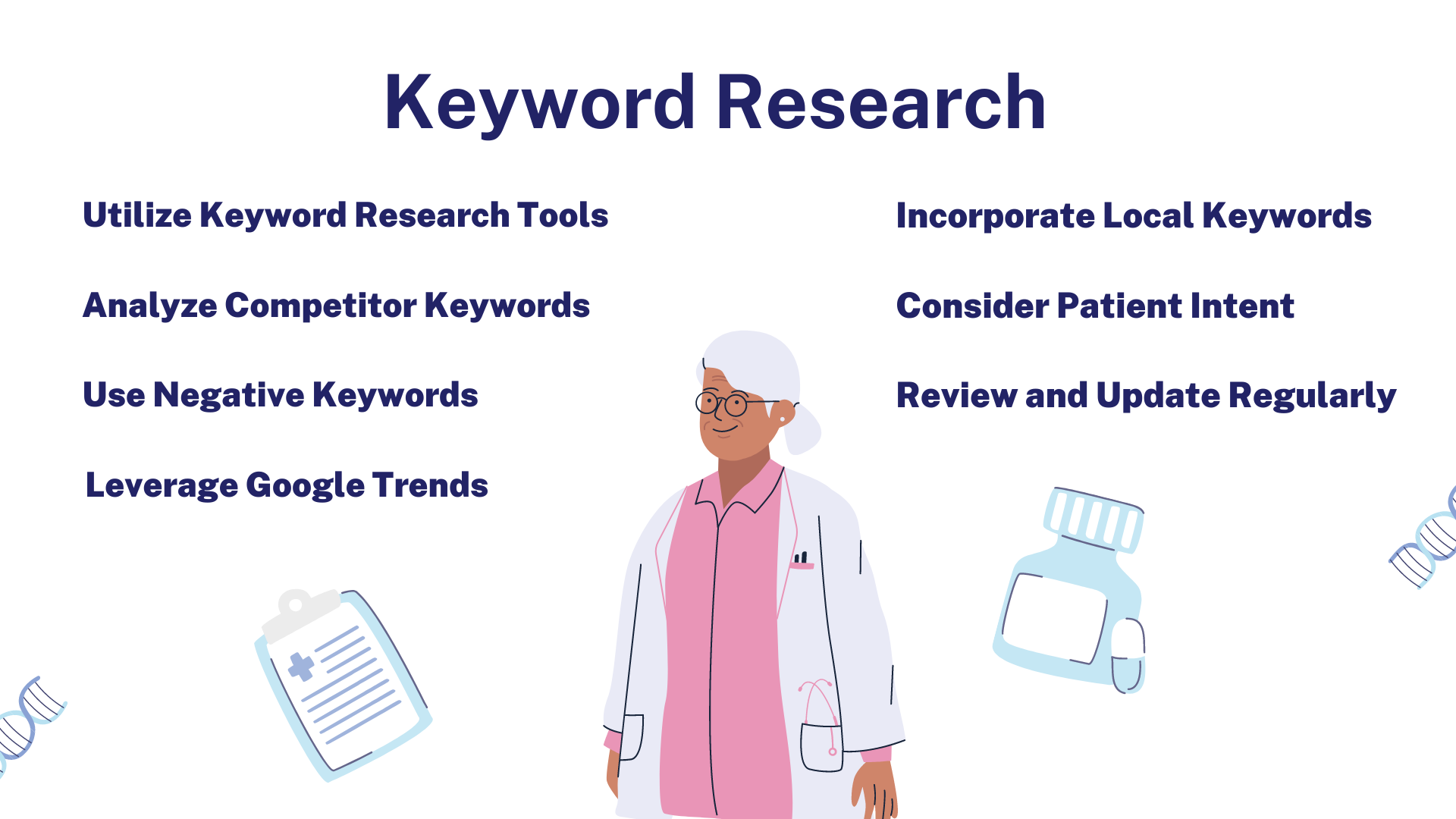Paid Search For Doctors: Strategies and Benefits
Paid search for doctors is essential in today’s competitive business. To increase their practice and attract more patients, doctors need strong tactics. Effective methods include PPC advertising.
The appropriate technique and finding clients is essential for numerous reasons. Budget constraints and market competitiveness are key. The right methods and resource optimization are the keys to success in promoting medical services.
Why Paid Search is Crucial for Healthcare Providers
PPC advertising charges advertisers per click. It’s like buying site visitors. This allows patients looking for healthcare services, to find you first in search engine results.

-
PPC boosts reach among potential patients in search results.
- Your ads can be targeted by region, age, gender, and interests with PPC.
- Such promotions are economical and allow you to track ROI. Cost-effectiveness comes from paying only for clicks on your ad.
- PPC advertising brings clients rapidly, unlike SEO, which takes months.
-
Effective internet presence boosts your practice’s credibility. PPC advertising at the top of search results portrays the clinic as an industry leader.
Competing in a Crowded Market
Medical industry patient lead generation is difficult. Standing out is challenging due to heavy competition from existing healthcare facilities and developing techniques. Patients are sometimes overwhelmed by options and may find it hard to compare doctors based on qualifications or offerings. Patient decisions depend on trust and reputation, thus practices must work hard to create and maintain credibility online and offline.
Paid advertising campaigns must be compared to search tactics to discover the best way to attract and convert clients.
Practices have to stay smart and knowledgeable as they negotiate these challenges to make sure their marketing initiatives find resonance among the noise.
Immediate Patient Acquisition Through Paid Search for Doctors Advertising
Healthcare providers may quickly engage prospective patients with PPC advertising. Healthcare PPC (Pay-Per-Click) campaigns let suppliers tailor adverts to people looking for medical care.
Smart ad placements and landing page conversion optimization can improve patient acquisition. Promotional discounts or appointment booking elements in adverts can remove barriers for potential patients and encourage quick action.
Healthcare professionals can improve patient interactions and integrate PPC ads into a larger patient engagement plan by adjusting campaigns in real time depending on performance metrics. Medical offices can acquire clients and build long-term connections by using these tactics.
The Role of PPC in Boosting Online Visibility
In a congested digital market, Google advertising helps medical practices stand out online. PPC strategically places advertising at the top of search engine results pages to highlight practices when someone searches for health services. This instant exposure builds brand awareness and user confidence, as top-positioned ads are seen as more legitimate.
Paid search for doctors is crucial for boosting website traffic to a practice’s website, which increases patient engagement and conversion.

Setting Up a Successful PPC Campaign
Register a Google Ads account. Create campaigns and ad groups based on your research and goals using the methods below. Select the correct campaign kind, such as Search Ads for quick patient acquisition.
Start by setting advertising goals. Choose whether to attract new clients, market services or raise practice awareness. Add call extensions, locational modifications, and site links to improve your advertisements. Targeting choices in Google Ads can help you concentrate your ads on particular groups, areas, and interests.
This will make the ads more relevant in search engines and help you to attract clients most likely to visit your office.
These are just the beginning of how doctors can use paid search to attract patients. Still, these are crucial since they form the foundation for more acts leading to achievement.
Keyword Research and Selection Specific to Healthcare
Ads depending on the keywords you select for the campaign will show on search engines. Making the correct decision here is therefore quite important. Likewise is the choice of specifics. These nuances not only help to improve your online visibility, but the right choice of them determines who will see your ad in the Google search.
Find keywords people may use to find medical services using keyword research tools. For a wider readership, use broad and long-tail keywords. Target your local location for patient acquisition by using local search intent keywords.

Use these keyword-finding steps to set up a paid search for doctors:
-
Find medical practice-related high-volume keywords with Google Keyword Planner, SEMrush, or Ahrefs.
- Find holes and possibilities in other physician’s keyword tactics. Knowing the terms they rank for might help target.
- Keep in mind if consumers are searching for information, booking an appointment, or comparing services when choosing keywords.
- Negative keywords stop ads from appearing for unrelated searches and improve campaign efficiency.
- Target longer terms that potential patients may use to search for services, as they have lower competition and greater conversion rates.
- As keyword performance changes, reviewing and upgrading your keyword list will keep your paid search advertising current and successful.
-
Google Trends can help you adapt to changing patient preferences by tracking search word popularity.
Budgeting and Bid Strategies for Medical Practices
Without the correct use of funds allocated to advertising and promotion, medical practice growth would be impossible.
In PPC campaign, competitive bidding determines how much a medical practice will spend per click. Think of it like setting an auction bid: offer enough to attract visitors without overspending. You evaluate and change your bid levels for keywords or ad placements.
Let’s find out what you need to know to effectively optimize your advertising budget.
- Enhanced CPC
This technique automatically modifies human bids based on conversion likelihood. ECPC optimizes budgets by boosting keyword bids for searches more likely to convert while keeping control over them.
- Target Cost-Per-Acquisition
Advertisers select a cost per acquisition, and Google automatically adjusts bids. For practices that drive leads and appointments, this technique keeps average expenses in line with planned acquisitions.
- Manual Cost-per-click (CPC)
Advertisers can set maximum CPC bids for each keyword using this classic bidding method. Manual CPC allows more keyword control but requires continual monitoring and analysis to stay competitive.
- Return on Ad Spend
Advertisers can set a goal ROAS using this strategy. Google automatically optimizes bids to maximize conversion value based on ROAS, making it ideal for valuable generated leads.
- Maximize Clicks
An automated bidding approach for increasing clicks within budget.
- Maximize Conversions
This strategy aims at boosting results without caring about click costs, making it effective for practices that prioritize appointment bookings or inquiries.
Understanding the effectiveness of your advertising expenses requires you to calculate ROI (Return on Investment). Set specific success metrics and measure marketing revenue and costs. This will assist healthcare institutions in identifying profitable initiatives and inform budget allocations.
Crafting Effective Ad Copy for Patient Engagement
Nobody understands more than doctors the need to be able to appropriately interact with people. Like in marketing, this is true in many spheres of life. Therefore, to achieve your goal, you should pay special attention to the copy.
- Know your target patients’ demographics, requirements, and pain spots. Customize your message to suit their issues.
- Highlight your services’ benefits, not features.
- Encourage visitors to book a time or visit your website immediately.
- Address patient concerns, wishes, and aspirations to connect emotionally. Show compassion for their health struggles to create trust.
- Share positive patient feedback to create a reputation. True testimonies help.
- Improve search exposure using location-based words related to your offerings. Local patients seeking care may benefit from this.
- Make sure your ad copy matches your branding and messaging.
-
Follow healthcare-promoting rules to prevent legal concerns. Ensure your ideas are supported and your language follows industry standards.
Creating Conversion-Optimized Landing Pages
These pages are the first interaction potential patients have with an ad, so they must be appealing, trustworthy, and action-oriented.
.webp)
PPC advertising strategies for healthcare professionals are impossible without optimized and well-constructed online pages.
- Start with an eye-catching headline that resonates with the desired demographic and reflects the ad’s promise.
- A lot of people will view the landing page on mobile devices, so make it responsive. Visitor retention requires fast loading times and optimized layouts.
- Writing convincing, patient-focused text that highlights service benefits and addresses patient concerns and inquiries. Bullet points simplify reading.
- Include obvious CTAs to book appointments or contact the practice. Act-oriented phrases like “Schedule Your Consultation Today”
-
Keep forms simple and ask just the necessary information. This makes contacting visitors easier and boosts conversions.
Overcoming Challenges in Healthcare PPC
The benefits of Google Ads for healthcare providers are undeniable, but medical practices should be mindful of its drawbacks. Competitive words are expensive and can easily deplete budgets if not managed properly. Practices must monitor expenditures and change bids to stay within budget and get visibility. Writing ad language that resonates with potential patients is tough, especially in a highly regulated field like healthcare, where advertising laws must be followed.
Search engine technologies change constantly, so methods must adjust to preserve and improve ad placements. Another challenge is converting traffic into appointments on landing sites. If consumers can’t discover what they need or have usability concerns, they may leave.
Finally, due to the complexity of patient acquisition, quantifying campaign performance requires a sophisticated analytics strategy to appropriately analyze PPC efforts.
Conclusion
Paid search for doctors may boost patient engagement and practice growth. Physicians can execute PPC campaigns that position their practice for success in a competitive market by understanding the benefits and tactics in this article. For PPC plan optimization, visit an expert or use healthcare-specific advertising tools.
For tailored digital marketing strategies, including PPC management for healthcare practices, reach out to Webugol – your partner in driving patient growth through effective online advertising.


